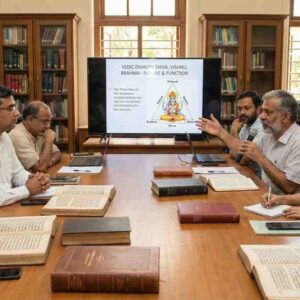Timeless Wisdom in a Rapidly Changing World
As humanity grapples with the complexities of the modern age—climate change, mental health crises, political unrest, and technological overload—the teachings of ancient philosophies offer profound guidance. Rooted in universal truths, these philosophies transcend time, providing frameworks for ethical living, self-awareness, and harmony with the world. By revisiting these principles, we can uncover actionable insights to navigate contemporary challenges with resilience and purpose.
1. The Philosophy of Dharma: Balancing Duty and Integrity
- Ancient Wisdom: Hinduism’s dharma emphasizes fulfilling one’s responsibilities with integrity while maintaining harmony with society and the environment.
- Bhagavad Gita: Krishna counsels Arjuna to perform his duties selflessly, aligning actions with the greater good rather than personal gain.
- Modern Application: In today’s corporate and personal lives, dharma offers a compass for navigating ethical dilemmas, ensuring that actions contribute to societal well-being rather than mere personal advancement.
2. Stoicism: Embracing Adversity with Grace
- Ancient Roots: Stoicism, a Greek philosophy, teaches acceptance of life’s challenges with equanimity, focusing on what can be controlled while letting go of what cannot.
- Marcus Aurelius: “You have power over your mind—not outside events. Realize this, and you will find strength.”
- Relevance Today: Stoic practices like journaling and mindfulness resonate in the modern context, helping individuals cope with stress, uncertainty, and failure.
3. Ahimsa and Environmental Ethics
- Non-Violence as a Principle: The ancient Indian principle of ahimsa (non-violence) extends beyond human relationships to include all living beings and the environment.
- Atharvaveda: Reverence for nature is intrinsic, emphasizing the interconnectedness of all life forms.
- Contemporary Challenges: Environmental degradation and climate change demand a return to ahimsa, encouraging sustainable practices such as reducing waste, conserving resources, and promoting biodiversity.
4. Mindfulness from Buddhist and Hindu Traditions
- The Power of Presence: Ancient meditative practices emphasize living in the present moment, fostering awareness and inner peace.
- Patanjali’s Yoga Sutras: The stilling of mental fluctuations is central to achieving clarity and balance.
- Buddha’s Teachings: Mindfulness (sati) as a path to liberation underscores the importance of intentional living.
- Modern Benefits: Mindfulness-based interventions are widely used to address anxiety, depression, and burnout, offering tools for managing the pressures of the digital age.
5. Confucianism: Community and Ethical Leadership
- Philosophy of Harmony: Confucius emphasized the importance of relationships, community, and ethical leadership for societal stability.
- Core Teaching: “To put the world in order, we must first cultivate personal integrity.”
- Leadership in Crisis: In a world marked by polarization, Confucian principles guide leaders to prioritize collective welfare over individual agendas, fostering trust and unity.
6. The Tao of Simplicity
- Living in Flow: Taoism, rooted in Chinese philosophy, advocates simplicity and alignment with the natural order (Tao).
- Laozi: “Nature does not hurry, yet everything is accomplished.”
- Relevance in Modern Life: Amid the fast-paced chaos of urban living, Taoism inspires individuals to simplify, slow down, and reconnect with their inner selves and the natural world.
7. Karma Yoga: Finding Meaning in Service
- The Joy of Selfless Action: Hindu philosophy’s karma yoga teaches that serving others without expectation of reward purifies the mind and fosters spiritual growth.
- Bhagavad Gita Insight: “Strive constantly to serve the welfare of the world; by devotion to selfless work, one attains the supreme goal of life.”
- Practical Relevance: Volunteering and community service, rooted in karma yoga, address modern issues like inequality and isolation, building a sense of purpose and connection.
8. Universal Philosophy of Interconnectedness
- Vasudhaiva Kutumbakam: This Sanskrit phrase meaning “the world is one family” reflects the universal human connection emphasized in Hindu philosophy.
- Global Implications: In addressing global crises like pandemics and climate change, this principle promotes collaboration, empathy, and shared responsibility.
Conclusion: A Bridge Between Past and Present
Ancient philosophies, though born in different eras and cultures, converge on universal truths about humanity’s relationship with the self, others, and the world. Their emphasis on ethical living, mindfulness, simplicity, and interconnectedness offers timeless strategies for navigating the complexities of the modern age.
As we stand at the crossroads of unprecedented challenges, revisiting these teachings is not an act of nostalgia but a necessary step toward building a more compassionate, balanced, and sustainable future. These ancient principles remind us that the answers to our modern struggles often lie in the wisdom of the past.













